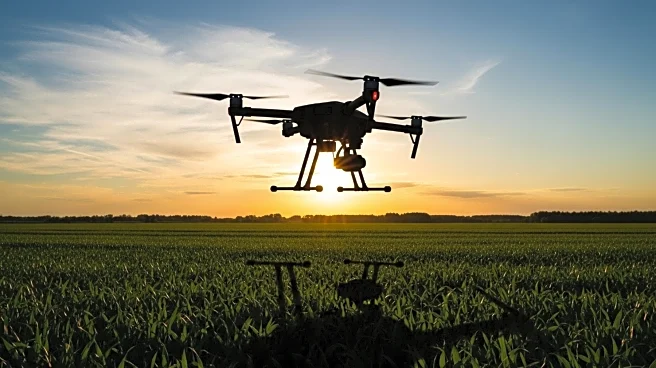What's Happening?
A drone company in Montcalm County, Michigan, known as Flying Acres Ag., is facing potential disruptions due to a proposed ban on Chinese-manufactured drones, specifically those made by DJI. The company, led by Bryan Hammis, utilizes drones weighing nearly 300 pounds to assist farmers in monitoring and applying crop needs across the state. The potential ban, which could take effect in December, would prevent these drones from obtaining new FCC licenses, effectively halting their import into the U.S. This development follows a federal law passed last year requiring a risk assessment of DJI drones by December 23. DJI has expressed its commitment to the U.S. market, urging policymakers to conduct a transparent and evidence-based risk assessment. The company highlights the economic impact of its products, which support over 450,000 American jobs and generate significant economic activity.
Why It's Important?
The potential ban on DJI drones could have significant repercussions for the U.S. agricultural sector, particularly for companies like Flying Acres Ag. that rely on these drones for efficient crop management. The removal of DJI drones from the market could disrupt operations for thousands of farmers, first responders, and small businesses, impacting their ability to operate safely and cost-effectively. DJI drones contribute over $116 billion in economic activity and support numerous jobs, making their potential removal a threat to the U.S. economy. The situation underscores the need for the U.S. drone industry to advance technologically to meet domestic demand and reduce reliance on foreign products.
What's Next?
The federal government is expected to complete its risk assessment of DJI drones by December 23, which will determine whether the ban will be implemented. DJI continues to advocate for a thorough and transparent evaluation process, emphasizing the security and data privacy measures of its products. Meanwhile, companies like Flying Acres Ag. are preparing to adapt to potential changes, with Hammis expressing hope for the future and a willingness to embrace American-made drones once the technology is sufficiently developed.
Beyond the Headlines
The potential ban raises broader questions about national security, technological innovation, and economic dependency on foreign products. It highlights the challenges faced by U.S. industries in balancing security concerns with economic interests and the need for technological advancement. The situation also reflects ongoing tensions in U.S.-China trade relations and the impact of policy decisions on local businesses and communities.










